#These anger issues are pushed down with the idealization and add to the self hatred. its bad.
Explore tagged Tumblr posts
Text
Oooo amazing counter points!!!
Here’s two fresh hot takes guys!
Tldr for the second half: Mk has other sets of ideals and flaws with the strong ones of the argument being self hatred, selfishness, and returning to normalcy. Mk never explicitly states his own feelings for how Wukong made him feel and due to parallels in season 3 and season 4, it seems like the narrative may be calling for him to cause damage to the world.
I saw a post talking about how there’s a deep mischaracterization of Mk in the fandom specifically about his monkey form and I’m here to dissect it. (WIth doodles!)
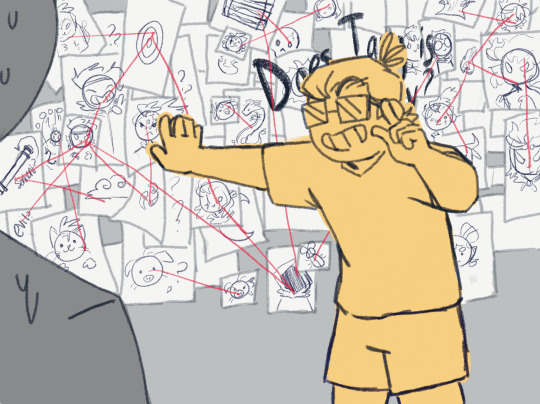
Tldr: Will Mk end up hurting his family in season 5 due to his new Monkey form? Most likely no, but it is possible that he indirectly hurts them by not understanding the limits of his power.
First things first let’s collect a list of attributes that we know Mk has from past seasons. This will serve as a spine or checklist to see if certain actions are possible. A thing to keep in mind though is the ranking of each attribute as the writers of LMK wrote there are characters as complex and sometimes abandon certain character values if their center value is threatened.
Mk’s character value list (in my opinion) is as follows:
-Family
-Strength
-Freedom
-Dependability
with family and strength being so close to each other, so sometimes strength ends up as Mk’s main concern. Of course, all of these end up mixing at times and in the first seasons we see the mixing of these values gets him in trouble
Desiring the freedom of choice over listening to Wukong (Pig Pong Panic). Wanting to be dependable but overestimating his strength (Duplication). Wanting to be strong but forgets his family in the process (shadow play). Eventually, he gets his priorities in check and has ended up sticking to this list for most of seasons 3 and 4.
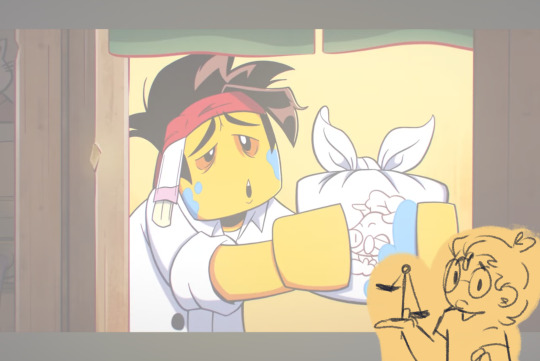
Now his flaws (in no particular order):
Impulsivity
Forgetfulness
Stubbornness
Blind devotion
He’s overcome a lot of these when he was forced to learn them in season 3. His stubbornness to not tell anyone what was happening with the LBD got people hurt. His impulsivity with his actions ended up crashing the ship, and almost sold his family to a goldfish demon.
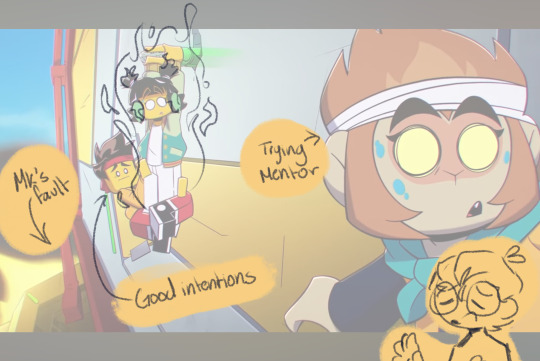
(Text: Mk's Fault, Good Intentions, Trying mentor)
So he’s had to come up with methods of working around that. Mk’s blind devotion to Wukong almost got Mei killed, and we see how he changes because of it. At the end of season 3, Mk doesn’t explicitly say that he sees Wukong in a new light but he heavily implies it with the metaphor of a bowl of noodles.
So… Will Mk go crazy and end up hurting his friends?
I highly doubt it. While I toyed with the idea, Mk is a lot smarter than the fandom usually gives him credit for. He knows Wukong is flawed, and he still trusts in him because he knows Wukong is trying. Mk has faith in Wukong’s strength and the fact that Wukong also heavily values family, even if his isolation makes it a lot harder for him to do so. Just rewatch the ending of season 3 where Wukong apologizes to Mk and watch as Mk comes to the realization that Wukong is trying so hard to make up for his past. (They also drive this point home in season 4 with how disappointed Wukong sounds at himself for not finding Mk in the scroll in the season finale.)

(Text: He's flawed and trying, Has to accept harsh reality, Dissociating Coping mechanism)
So what about Mk’s impulsivity? I doubt that’d be something that directly harms his friends. He’s worked on his impulsivity by working with others (Redson in season 3 and Mei’s planning in season 4) to help fill in the gaps in his plans. In order for his impulsivity to harm others, you’d have to break that family value first or raise that value of strength and freedom. Most likely this flaw can manifest in Mk overdoing his Monkey form ™ and sending a shockwave that accidentally hurts the people around him. Probably manifesting either in training or while having fun with Mei (think about how Mk was in the Bad Weather episode).
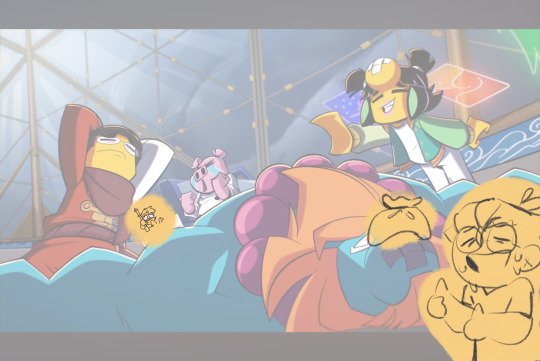
Okay, what if Mk is tricked into it like he was in Season 4 (back to the flaw of blind devotion)? Mk has spent every season backstabbed by someone he trusted. We see him snap at Azure after he finds out that he was going to keep Wukong in the scroll. He snaps at Macaque in season 4. It’s safe to say that he’s learned, at least partially, to not trust others so blindly. Mk is also supposed to have gotten the “skill of self-reflection” in “Revenge of the Spider Queen” but his reflecting has mostly just impacted the other flaws.
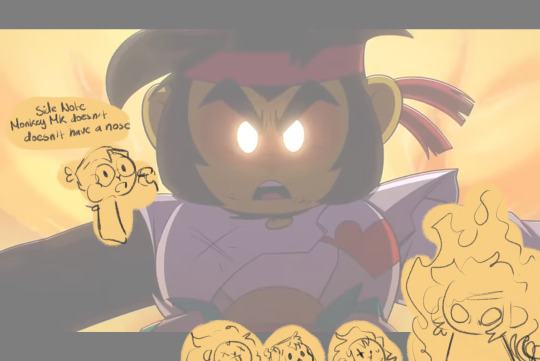
(Text: Side note, Monkey Mk doesn't have a nose)
But there is one possibility I toy with, bottled up emotions. Mk has extremely big emotions but hates showing any emotion that can be seen as negative. He loves being happy and he’s not afraid to show it, but as soon as those emotions turn to doubt, anger, or sadness he bottles them up fast. He knows he can rely on his family, but he’s stubborn and thinks that his emotions aren’t worth that hassle. Take the ending of season 3 where Mk states that “he tries not to think too hard” about his own place in the universe, which could be due to a fear of losing the value of freedom if he has a specific role to play in the universe.
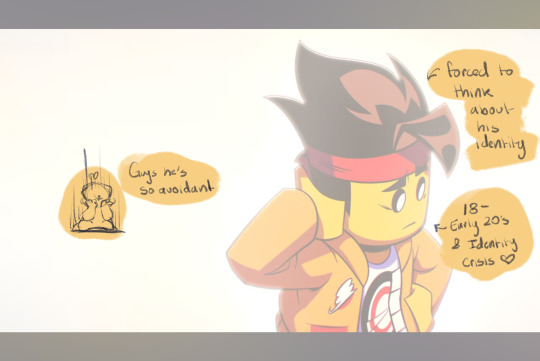
(Text: Guys He's so avoidant, forced to think about his identity, 18-early 20's and Identity crisis)
It’s worsened by the fact that every. other. character. avoids. their. emotions. No other characters in this series are open about their emotions except Tang and Sandy. And from season 3 (and a bit of season 4) we know that Mk doesn’t view Tang in an extremely positive light.
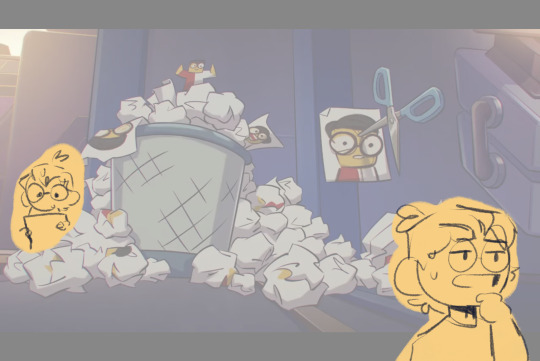
Not exactly negative, but his admiration lies more on the rest of the team. Macaque points this out in season 2 stating in “Shadow Play” that Mk should talk out his insecurities, but no one else does that.
That being said Mk isn’t entirely forgetful either. Macaque was a season 1 villain with his betrayal going through season 3. Mk’s high value of family, and flaw of blind devotion, make him want to give him a chance as Macaque’s past is connected with Wukong’s. HOWEVER, Mk is also stubborn and hasn’t forgiven Macaque’s actions. That’s why he snaps, plus the fact that Macaque is terrible at direct communication. Like I said before, Mk won’t directly hurt anyone he cares about, but if his monkey form is highly connected with his emotions (as most magic tends to be) having those bottled-up insecurities might accidentally cause Mk to unleash more power than he means to.
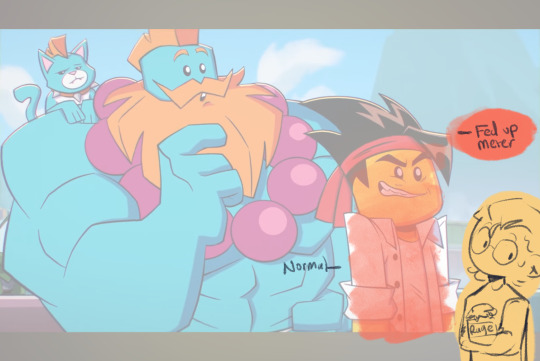
(Text: Normal, Fed up Meter, rage (on jar))
I have no idea where season 5 is going to go, but I’m so excited about the possibilities.
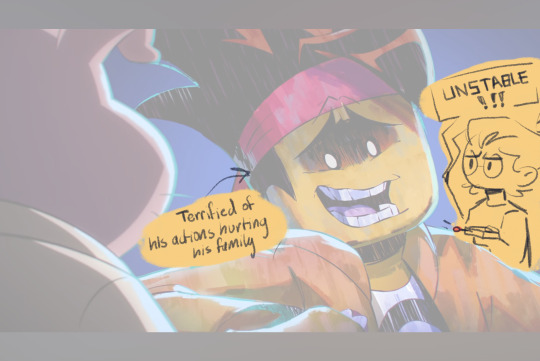
(Text: Terrified of his actions hurting his family. UNSTABLE!!!)
#Thats like. super watered down and the whole essay has quotes and parellels! The evidence is strong and please read#That being said heres more thoughts#I think these ideas can exist together. I agree that Mk is inherently selfish but i don’t think it comes out of malice#I think that because Mk is a high dopamine seeker and looks for fun. he ends up committing more selfish acts to achieve it (impossible del)#He’s dependent on them for support and to fill in for where he has his flaws and yet he pushes them away like wukong does#If he’s made from the same rock as wukong. most likely the story is going to lead into the direction of how Wukong COULD have been#and that could be giving Mk the choice as to if he wants the power leading to distraction or not#I 110% agree that Mk’s going to snap and i failed to mention that im almost certain that Mk has terrible anger issues that match pigsy#These anger issues are pushed down with the idealization and add to the self hatred. its bad.#that being said#I think the theme i’m looking at in the show is ‘identity’ and how to create it in a world that wants us to be something else#The theme of you have to be a hero or a warrior. you’re good or your bad. You’re who your past says you are. are all labels#Mei struggles with the identity of a dragon. Sandy and Pigsy are demons. And Tang is human. and there’s a point where each character#thinks that’s all they are. Mk is supposed to be a fresh slate but is constantly forced to choose between different identities#that he never asked for. (the return to normalcy value plays in here).#If that’s the cause. I think that Mk being given a choice as to if he wants world-destroying power or not will be the last season’s choice#Last of all…. i hope they let that boy snap. I hope that we get an episode where Mk just go on a tangent about how he feels#and let him get destructive.#Post addition#long post
191 notes
·
View notes
Text
Tangled the Series Character Analysis: Childhood Trauma POV
I can't believe Tangled the Series really created two incredible antivillains and threw them in direct contrast with the pre-existing golden couple. I love what the showrunners did with the main quartet, so I made a very subjective analysis post about it from a Childhood Trauma POV. (Spoilers, obviously.)
The Boys

The series' focus is on Rapunzel, and by association her direct opposite, Cassandra, so the boys get comparatively less screen time. But it doesn't take long to figure out that Varian is meant to be a parallel for Eugene—these are two people dealing with the absence of parental guardians, struggling to reconcile the lives they previously had with their changing ideals in relation to a less-than-perfect Father Figure.
They both respond to the helpless state of being young, alone, and powerless by trying to take back power in any way they can. Eugene reinvented himself and buried his desires for a family. Varian throws in everything he has into recovering what he lost, because he's a child and the best solution he can think of is to return to the familiar safety of his father's presence. A significant portion of his desperation is fueled by fear of his father’s disapproval, because as much as Quirin loves Varian, he wasn’t the dependable voice of support. Varian needs approval from outside sources, which was also Flynn Rider’s purpose in life, once upon a time. (Again, parallels.)
Throughout the series, the boys' relationship with each other transforms from exasperated incomprehension to easy understanding. The process is hastened as Eugene lets himself realize he cares a lot about troubled kids who remind him of himself. He becomes aware that children should not be required to survive on their own like he and Lance had. Spurred on by his significant other's love and encouragement, Eugene is able to acknowledge the adverse affects of his childhood on his life and start moving on. His extending a ready hand to Varian is his process of healing. Though Eugene's first priority will always be Rapunzel, he truly wants to save Varian from the uncontrollable volatility of risky decisions because he knows that downward spiral intimately.
Of course, there is a difference between thieving from the rich and planning the destruction of a kingdom. We'll get to that later.
The Girls
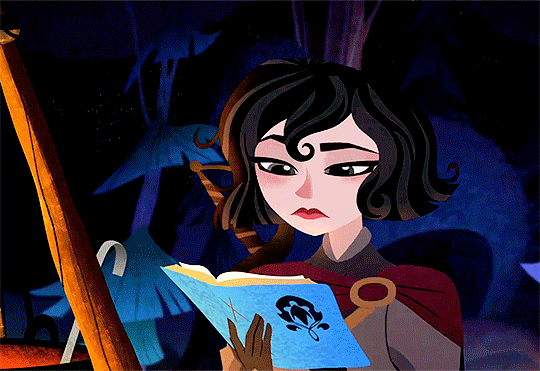
Rapunzel and Cassandra are the biggest driving forces of narrative power in the show, and they are survivors of child abuse. Every one of the main quartet has Parent Issues, but Rapunzel takes the crown (figuratively speaking) with this one. She was kidnapped and groomed into a life-giving doll, and she was only able to escape her abusive adoptive mother through incredibly traumatizing means. For Cassandra, it was neglect, and even her loving adoptive father couldn't leviate the scars left on her childhood mind.
They're a classic case of Golden Child vs. Scapegoat, which is a common case seen in siblings raised by Narcissistic parents. When one child is "favored" more than the other, the kids experience vastly different childhoods, resulting in resentment that stems from their inability to understand each other. Rapunzel and Cassandra are both jealous of what the other had—Rapunzel wants Cassandra's casual, practiced ease with freedom and personal agency, while Cassandra wants the attention and respect that Rapunzel is given by the status of her birth. Because they're unwilling to speak candidly about the unique hardships of their childhood, what results is a series of miscommunications that put a strain on their friendship.
Cassandra and Rapunzel both want the other in their lives, but how they attempt to make that connection is very different. Cassandra wants to be a helpful, essential force in Rapunzel's life. Unfortunately, Rapunzel has been raised on the idea that when push comes to shove, no one will help her survive. Cassandra interprets Rapunzel's desire for independence as Rapunzel scorning the connection that Cassandra is attempting to create. Add in some manipulation from an ancient evil, and Cassandra decides she is done exhausting her emotions for Rapunzel.
Rapunzel, on the other hand, wants absolute honesty in her relationships. Gothel raised her on lies, so she spurns deception. But Cassandra knows the merits of protecting herself by holding her opinions in, which is where the misunderstandings occur. Rapunzel cannot trust someone who isn't completely forthright with her. She's tired of dealing with liars, and she grows afraid that Cassandra will cause her the same pain as Gothel did. But the thing is, Cassandra is not Gothel, and Rapunzel loved Gothel. She couldn't save Gothel, but maybe she can save Cassandra. It's not too late.
Rapunzel doesn't know when to give up on Cassandra because she is aware that she and Cassandra are similar people. Giving up on Cassandra would feel too much like giving up on her own hopes for a happy life. Rapunzel can't let Cassandra be unhappy. This princess cares too much, loves too hard. She never learned how to write people off because you can't survive a childhood like hers with that much cheer if you don't hang onto your optimism like a goddamn lifeline.
This is Rapunzel’s method of taking back power for herself: saving others. Rapunzel could have been Cassandra. Rapunzel is trying to believe she herself is worth saving—therefore, Cassandra must be worth saving as well. Rapunzel's significant other is giving her a stable source of love and support, but without a proper resolution to Cassandra's struggles—a final proof that despite Gothel's influence, they can both be happy—Rapunzel would feel incomplete.
The Golden Couple
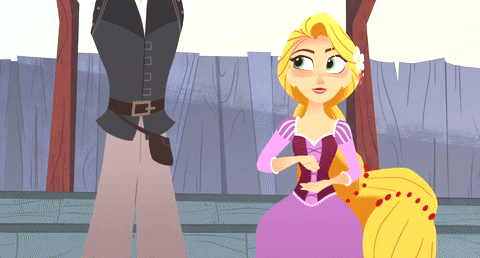
At the end of the day, Rapunzel and Eugene are fundamentally good people. If it comes down to it, they would be unable to sacrifice the world for their own desires. (Eugene's thievery doesn't count as an expression of true desire because it was literally his method of survival. An expression of true, selfish desire for him might've been something like manipulation and abduction for the purposes of making people stay, but Eugene is not Gothel and he would never do that to anyone in a million years.) (On a side note, Rapunzel's selfish desire might've manifested in the abandonment of all duties and personal connections in favor of eternal exploration, or revenge towards a kingdom that failed to save her, or a thorough destruction of authority figures—but she loves people too much and would never be able to forsake her family.)
Life threw a lot of rocks at them, but these two came through it marginally well-adjusted. They affirmed their love for each other in a violent, unforgettable manner, which makes it easier for them to trust in each other's affection. Eugene would've been okay with never finding his biological father, just as Rapunzel had been okay with her biological parents' inability to protect her. They have no wish to punish the world for what they suffered. They’re content with who they are. They're just glad they made it, that they're finally allowed to love someone without being afraid. They're each other's saving grace.
The Antivillains
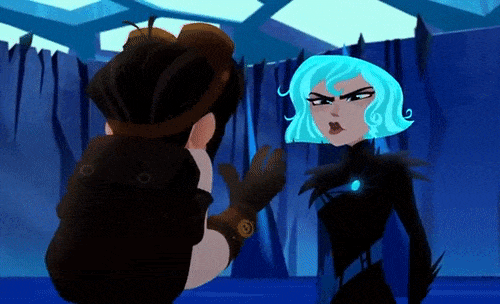
This is the difference between Hero and Antivillain: Cassandra and Varian are willing to punish the world for what happened to them. There’s a very faint line between justified retaliation and venting. In their desperation and anger, they cross the line, and they’re unable to stop themselves once they get going. Unlike the Golden Couple, Cassandra and Varian refuse to settle. They want what is owed.
Also, they really, really hate themselves. (This is important.)
Varian believes Quirin is the ultimate source of affirmation. The fact that he lost his father by way of his own dangerous experiment, coupled with the fact that no one prioritizes his call for help in the face of national disaster, is enough to make him feel isolated from the world. Though he is burdened with a growing sense of remorse for his deeds, he doesn’t stop resorting to drastic, harmful measures to get his father back until he is forcefully stopped by betrayal from his allies. He finally makes the full transition from “antagonist” to “protagonist” when Rapunzel risks herself to save Quirin from the rocks. If Quirin could not be saved, there’s a possibility Varian might have stayed an antagonist, unenthusiastic though he may have been in his villainous role. As long as Quirin is trapped in those rocks, Varian remains the villain who put him there.
With Quirin safe, Varian allows himself to take huge steps in healing. He slowly rediscovers his self-worth, one that is separate from Quirin’s approval. Rapunzel—and by extension, Eugene—play the friendly, supportive role to Varian’s ingenuity, helping him along in his quest for self-acceptance. Varian still has trouble working through the heavily ingrained self-hatred, but he recovers enough confidence in his own judgment that he takes Eugene’s warning to heart and is able to install a safety device in his father’s helmet, just in case.
This is the Varian who meets Cassandra in the Tower that once belonged to Gothel. At this point in time, Cassandra has been manipulated into thinking of herself as weak and unimportant in comparison to Rapunzel. Her adoptive father, much like Quirin, was too gruff to be vocal with approvals. Her efforts have not been met with successes. She feels like a failure, and she hates feeling like a failure. This is Cassandra’s method of taking back power: by turning herself into someone unforgettable. If she can make something of herself, she’ll finally be able to prove Gothel wrong. She can be just as special as Rapunzel, if she’s given the chance. She wants that chance.
Similar to Varian, Cassandra doesn’t stop her downward spiral until her supposed ally and mentor betrays her and forcefully takes her power away. Only when there are no options left does she allow herself to admit that she was wrong. She is then rewarded for her honesty with Rapunzel’s love and trust. Armed with a new confidence, the sisters vanquish the evil together in an epic showdown that will long be remembered. Cassandra finally gets her dramatic hero’s tale.
Rapunzel and Eugene have an internal compass that lets them make snap decisions. They don’t have the healthiest self-esteem, but they can at least stand by what they think is right. Comparatively speaking, Cassandra and Varian have terrible self-esteem. They don’t trust their own judgment and are heavily influenced by outside forces. Without the constant barrage of trust and affection from Rapunzel, who is akin to a blazing sun when it comes to personal loyalty, these antivillains might never have reached their redemptive ending. They wouldn’t have been able to let go of their twisted priorities without outside influence. Can’t blame them for it, though.
It’s no surprise that Cassandra and Varian are relatable to many people. Who wouldn’t want to reclaim what was taken from them during childhood? (Of course, the problem occurs when you start hurting others to reclaim what you lost.) Their journey is a different kind of vulnerable from Rapunzel and Eugene’s journey, and it’s extraordinary in its detail. This show is essentially a long exploration of the various ways a parent can mess you up and the coping methods of kids who want to become more than their past, which is totally up my alley of expertise. I’m grateful I got to watch them grow taller than their trauma.
Finally, here’s a parting gif of Lance, because I love him and he’s a well-adjusted ray of sunshine. We all wish we could be as mentally stable as Lance—the main quartet included.
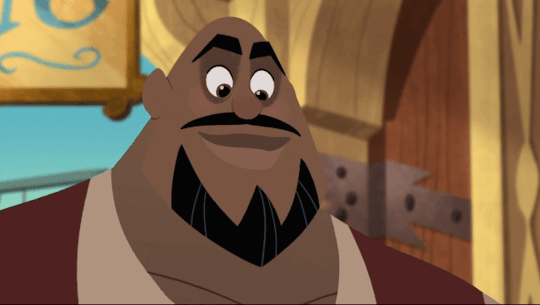
#tangled the series#rapunzel#cassandra#varian#eugene fitzherbert#character analysis#my thoughts#child abuse#trauma recovery#when the villain origin story is self-hatred
304 notes
·
View notes
Link
YO!
We have a character analysis on Prussia based on Hetalia World Stars/character songs/the anime (as those are the only things I have full access to)
Full script under the "read more”
Clapping Nasty! Thot! Turbo! Virgin! Chaotic! Energy! Clapping
I was dared to say all those things first thing when starting this video. Except that last one. That last one was my own doing.
Anyways, let’s give a quick overview of how this analysis is gonna work. First, we need to discuss what may be considered the elephant in the room to people in the Hetalia fandom who know me on Discord.
Specifically the people in one particular RP server I’m in.
We need to talk about canon.
Now in the past I’ve made a point of the importance of canon when representing these characters. And I stand by everything I’ve said in the past, just not the way I said it. See, I don’t think the people I’ve talked to about it really understand what I meant and that may be my own fault.
When I tried to push the importance of keeping true to what we know about the characters, I got hit with comments like “well I like to add my own ‘glam’ to the character” or “there’s not much about my muse in canon so where does that leave me?” and so on and so forth.
What I really meant by ‘keeping true to canon’ in Hetalia is that we shouldn’t purposefully go against something we know for a fact is true. Even though it’s really easy when there’s not a lot of material for the character in question in the first place, I just can’t understand the appeal of doing something like that. To put it simply, I fell in love with the characters for who they are, not for who I believe they should be.
This issue came up again - unrelated to the first time it was brought up - on tumblr when someone made a popular post about people being told they’re wrong for representing the characters of Hetalia in certain ways outside of canon because they were from the area in question and wanted their character to be more accurate to their culture as they saw it.
Which is a really complicated, controversial and specific to Hetalia discussion, to be perfectly honest. It’s still a great discussion to be had, though!
Where do we draw the line between cultural/historical accuracy and canon characterization? How do we decide what’s more important? When do we let one side win out if we let it win out at all?
These are all great questions that should be saved to be answered another time on another video and/or tumblr post.
For now, let’s just talk about the meaning behind the title of this video and then I promise we’ll get into the character analysis.
If any of my Dragon Ball fans are here, you’ll probably recognize said title from “This is My Goku” and yes I did it on purpose. I’m sort of parodying my own video because that one was so serious and fueled by anger, spite and hatred that it turned out pretty comical in nature. And this one is one fueled by happiness, positive energy and genuine curiosity.
I’m not here to prove some sort of point, I’m here to see how in-line my personal idea of the character is with how he’s represented in the most recent version of “canon” in Hetalia. (i.e; How well does my headcanon fueled characterization fit with the Hetalia World Stars comic strips that HetaScanalations has so graciously shared with all of us?)
A LOT of what we know of Prussia cannot help but be based on personal headcanons and popular fanons alike. He’s frankly not in the series enough to do a full proper analysis of his character because we only really see him in passing in pretty insignificant strips.
So while I really wanted to call this video “Hetalia Prussia Dissection” I can’t do it. I really honestly either don’t have the skill level or really don’t have the material to do that concept justice. So today we’re going to go into what’s canon and what my own ‘glam’ added to the character really is. (See what I did there? I have nothing against combining headcanon with canon, I just don’t like letting headcanon completely and purposefully override canon but again, that’s a topic for another day.)
So with all that said and understood, let us begin our awesome journey.
Okay so here’s the dealio, Prussia is a narcissist and we’re gonna go into the psychology of that in depth and talk about what all that entails and see how much evidence we have to support that claim in canon.
According to PsychologyToday which, to my understanding, is a credible enough source for quick glances into the minds of people, while having a superiority complex does play a part in narcissism, it’s really a feeling of fear of showing vulnerability that leads it.To quote; “The narcissist fears that acknowledging any weakness will allow someone else the chance to take advantage of him or gain power over him.” And another quote: “Simply put, true narcissists have zero interest in introspection or self-improvement. Their guiding principle: Never, ever let your guard down.”
Now, none of the Hetalia World Stars comics, the Anime nor the character songs themselves actually show Prussia being afraid of being vulnerable explicitly stating, but if we look at the symptoms of narcissism and his history, we can see, in my honest opinion, where that comes into play.
The DSM 5th Editions symptoms for narcissistic personality disorder as described by Leon F. Seltzer, Ph.D. on psychologytoday.com are as follows:
1. Has a grandiose sense of self-importance.
2. Is preoccupied with fantasies of unlimited success, power, brilliance, beauty, or ideal love.
3. Believes that he or she is "special" and unique and can only be understood by, or should associate with, other special or high-status people (or institutions).
4. Requires excessive admiration [regularly fishes for compliments, and is highly susceptible to flattery].
5. Has a sense of entitlement.
6. Is interpersonally exploitative.
7. Lacks empathy: is unwilling to recognize or identify with the feelings and needs of others.
8. Is often envious of others or believes that others are envious of him or her.
9. Shows arrogant, haughty [rude and abusive] behaviors or attitudes.
This particular author of this particular article goes on to add a few more traits and symptoms. Those being:
1. They are highly reactive to criticism
2. They have a low self-esteem
3. Can be inordinately self-righteous and defensive
4. React to contrary viewpoints with anger or rage
5. Project onto others qualities, traits and behaviors they can’t - or won’t - accept in themselves
6. Have poor interpersonal boundaries
This article began by stating that only five of these fifteen traits need to be met in order to be considered for having narcissistic personality disorder. So let’s take a I’m-discovering-writing-this-analysis-as-I-go dive into my notes of where all Prussia's appearances are with these symptoms in mind to see if we can name at least five instances.
Right off the bat in both cases with the first listed symptom and the first appearance of Prussia in Chapter 12 where he unifies Germany, Prussia considers himself the one that is destined to lead the newly formed nation of Germany as his older brother. This is the idea of self-importance. Basically he has the idea of “If I’m not the one to do it, then no one can do it properly.” hence his fighting with Austria (and I bet winning said fight didn’t help.)
So there’s one.
But wait! There’s more in this chapter!
That same instance of him believing he needs to be Germany’s older brother goes along with the symptom of entitlement. It MUST be him simply because it MUST be him.
So we’ve got two now.
“Is highly susceptible to flattery”. When I read that I knew exactly what chapter we were going to discuss. I literally wrote in my notes for chapter 294 “Prussia is weak to flattery” because in the beginning of 294 and the whole of 293, Prussia was arguing with his king Frederick I about how much focus should be put on clothing, but the INSTANT Frederick I mentions that Prussia would probably look cool in the flashy outfits, Prussia caves and goes to spy on France to see about getting said flashy outfits for himself.
That’s three~ Two more and we’ve got ourselves a narcissist.
Being ‘arrogant’ is defined as ‘having or revealing an exaggerated sense of one's own importance or abilities’ and if that doesn’t describe Prussia in literally all of his “I am awesome!” glory, I don’t know what does. It should be self-explanatory to any fan of this series that, yes, Prussia is very arrogant.
Four down, one to go!
Number two in our list of symptoms “Is preoccupied with fantasies of unlimited success, power, brilliance, beauty, or ideal love.” I BELIEVE this includes having constant daydreams about past glories as well as bringing them up all the time or when discussing said past glories, only discusses how great and awesome they were at the time.
Cough-cough - Prussia’s diary in 339 where he openly admits that said diary is mostly him saying “You are awesome” 20 times over.
And there we go. Let me know if you think of anymore instances in ANY official material that fits into these symptoms. I’d love to hear about them.
So with those five understood, it’s safe to assume Prussia is in fact a narcissist which - I know - comes as a shock to literally NOBODY but I figured it was important to actually pull up evidence for as opposed to just stating it as a passing fact and moving on like a lot of us Hetalians tend to do.
Explaining understandings of characterization is the fun part of character analysis, after all.
So let’s backtrack a little. Remember how that first article said being a narcissist comes from having a fear of vulnerability? Well, let’s go into headcanon and fanon land for two seconds as we read between the lines to find these signs of vulnerability based on the assumption that Prussia does in fact have this disorder.
Constantly in his official character songs, like “Mein Gott” or the Bad Friends Trio’s song “Overflowing Passion”, Prussia can be heard singing about how ‘it’s great to be alone!’ I take this to be a sign that Prussia understands that everyone is aware of him being lonely but he takes that understanding and turns it into a sign of ‘awesomeness’ as opposed to a weakness. He’d rather turn something most of humanity recognizes as a negative into a positive than admit to his own sadness. It’s the last thing he wants.
Let’s continue down this headcanon rabbit hole and talk about the wonderful Law 46 that was signed in 1947 after WWII and before the Berlin Wall. This is the Law signed by the Allied Control Council (France, America, Britain and the USSR) that stated that Prussia’s excessive militarism combined with excessive nationalism was too dangerous for the world as it was to blame for “repeated German pestilence” as Churchill put it.
Basically, this is the moment Prussia lost his nation and, in popular fanon, became East Germany.
There is no way on God’s green Earth that ANYONE is going to convince me that losing his nation like this - not just losing it in general but losing it to a piece of paper instead of a glorious battle that wiped his resources out - didn’t hurt and still to this day hurts Prussia on a deep emotional level. But do we ever see him talk about it?
No. And why is that? Because that would be a vulnerability.
See, I interpret Prussia as being my favorite type of character. The character that smiles and laughs and puts on a show about how great life is even though deep down they’re suffering from some serious issues whether it be trauma, negative mental health or just bad memories.
I know, I know, that’s not exactly a rare character type but I really don’t care, it’s still my favorite. It’s also not something that’s hard to see in real life. People will often hide behind a mask. We see it all the time in celebrities that people will refuse to ask for help when they are suffering because they’d rather everyone believe everything is fine for this that and/or another reason.
(Honestly though, can’t relate, because when I’m sad I let everyone know but that’s just a personal aside)
Getting off the narcissism train, let’s talk about something significantly less serious.
Prussia likes cute things and is attuned to nature. He’s constantly making references to nature like saying that it’s a great sign that even rabbits will prostrate before him in 299, saying “it’s cool like a wild little bird” in 293 and also mentioning how cute a little chirping bird is in his songs “Mein Gott” and his “Marukaitte Chikyuu.” Not to mention his image for his character profile shows him with a little bird on his head and holding a stuffed bear.
This ties in to both wanting to keep young ones’ innocence in tact as well as how in real life history, the German people had the most respect for nature at a time.
I have a friend who has taken multiple art history classes tell me that in German art there are often scenes of humans being lesser than nature that show how vast, beautiful and truly terrifying nature is.
As for Prussia wanting to help younger people keep their innocence, there is a chapter (chapter 187) where Prussia is reading Grimm Brothers Fairy Tales to a dying Holy Roman Empire (a character still portrayed as a child) and when questions arise like “Why would the witch be mad about Rapunzel’s clothes not fitting her and why would she blame the prince? There was no evidence of the prince bringing in food for her to eat.” he literally throws the book out the window.
He’s later, in the same chapter, shown to be writing the Grimm brothers asking them to PLEASE make the stories more actually child friendly if they’re going to advertise them as being stories for children.
So while in headcanon I imagine Prussia as not-shy-at-all about such things around other adults, it’s another story around children and those he perceives to be innocent. He canonically wants to preserve that cute nature of theirs and will do what he can to do such.
Random fun fact about the Hetalia character of Prussia; he gets really whiny when he’s hungover in chapter 32. He begs Germany to make him food and do other things for him even while Germany himself is also hungover. Also he says “I can’t eat things with faces on them” which woooo boy I’d hate to see what our cute-little-bird loving fool would think of Peeps.
Anyways, I think that’s about all I’ve got and surprisingly, we actually did have a lot to talk about with Prussia using mainly the comics and only partially headcanon. And it’s not even including the original run of the webcomic and manga since I don’t have easy access to those. And we didn’t really discuss the anime too much (mainly because it was just more of what we were able to see in the World Stars serialization).
Please feel free to continue the discussion in the comments. I’d love to hear/read more about one of my three favorite characters and how he’s perceived by others.
1 note
·
View note